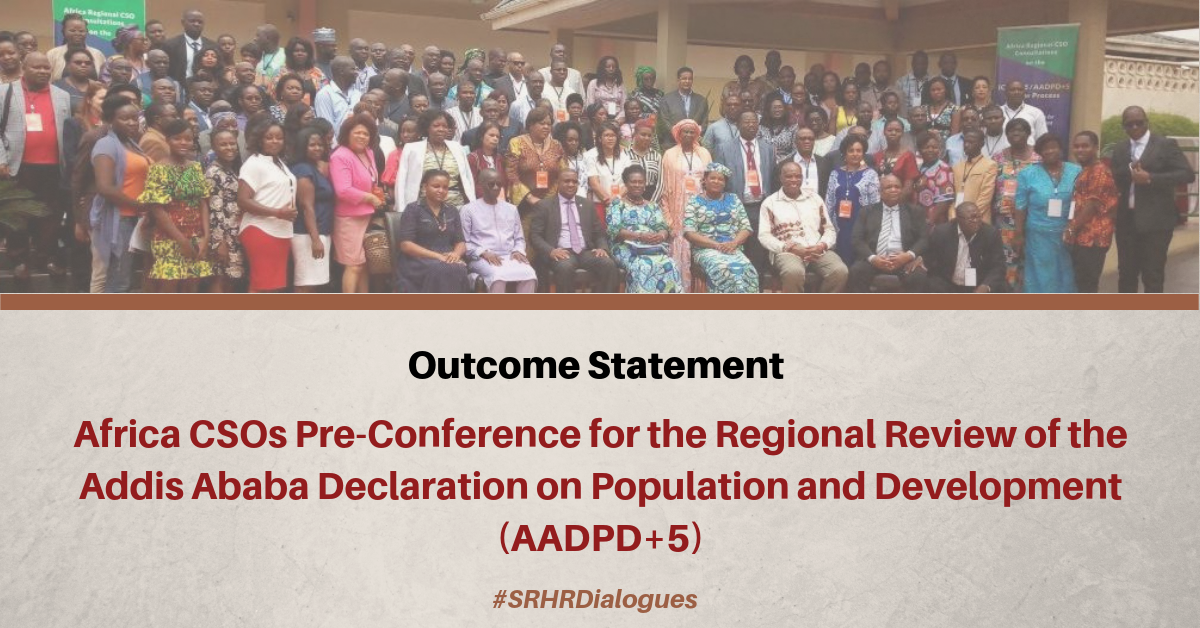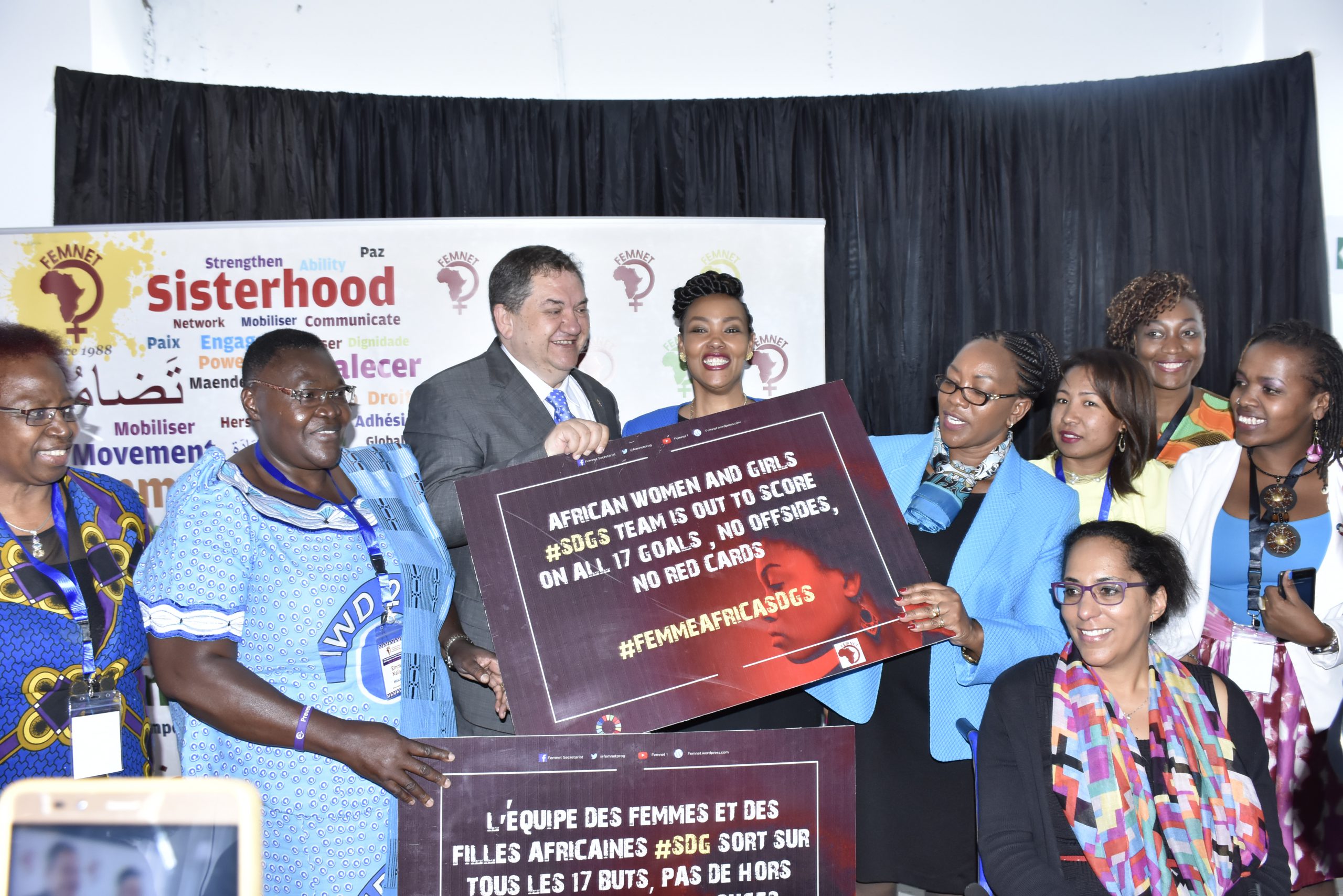
CSOs Key Recommendations on the Population and Development Agenda in Africa – AADPD+5
Africa CSOs Outcome Statement following the Pre-Conference for the Fifth Regional Review of the Addis Ababa Declaration on Population and Development (AADPD+5), held in Accra, Ghana, from 30th September to 1st October 2018
Preamble
We, civil society representatives in our diversity from across the African continent, welcome the 5th year review of the Addis Ababa Declaration on Population and Development (AADPD) as its full implementation remains critical to our quest to attain sustainable development. We note the importance of ensuring the implementation of AADPD is linked to continental and global instruments such as the AU’s Agenda 2063 which defines the “Africa We Want”, the 2030 Agenda for Sustainable Development, the Maputo Plan of Action for the Operationalization of the Continental Policy Framework on SRHR and the Protocol to the African Charter on Human and Peoples Rights on Women’s Rights in Africa,
We underscore the need to ensure that the outcomes of the AADPD review are linked to the continental and global level reviews of Agendas 2063 and 2030,
Accountability to AADPD+5 must be built on the principle of leaving no one behind. This starts with the recognition of the role of civil society in contributing to the implementation of AADPD+5. Further, the implementation of AADPD+5 must ensure the recognition of the diversity of the constituencies that we represent including: women and girls, adolescents and youth, persons with disabilities (PWDs), persons living with HIV (PLHIV) and other marginalized groups without distinction of any kind.
We therefore call on member states to commit to the following:
Health
- Prioritize and adequately finance universal access to comprehensive, quality and integrated health services including sexual and reproductive health services. This requires that countries meet the previously recommended 15% of GDP expenditure for health as per Abuja declaration and on the provisions for expenditure on reproductive, maternal, newborn, child and adolescent health (RMNCAH) as per the 2016-2030 revised Maputo Plan of Action
- Implement existing policies including the recently revised Maputo Plan of Action 2016-2030 on Sexual and Reproductive Health and Rights.
- People’s SRHR remain critical to achieving AADPD. We therefore implore member states to ratify, domesticate, implement and lift any reservations on:
- The Protocol to the African Charter on the Rights of Women in Africa
- The African Charter on Human and Peoples’ Rights
- Develop comprehensive Adolescent and youth health strategies and programs which include SRHR and Comprehensive Sexuality Education (CSE)
- Develop health strategies and plans that address increasing HIV prevalence in countries; and adapt to the impact of climate on communities in particular poor, marginalized and underserved communities.
Dignity and Equality
- Review, amend, harmonize and enforce laws and policies that address discriminatory practices and customs that have an impact on marginalized populations including women, girls, PWDs and elderly people in accordance with the African Charter of Human and People’s Rights.
- Align national legislation and policies with ratified regional and international instruments and accelerate realization of gender equality and women’s empowerment.
- Address legal and policy barriers to access sexual and reproductive health services for all including structural barriers espoused in policies such as spousal and parental consent, for women and young people and others that hinder access for other vulnerable populations;
- Increase and enhance young people and women’s participation in decision-making and leadership positions at all levels through effective implementation of appropriate policies, programs and affirmative action;
- Provide universal access to affordable quality, comprehensive education and skills development, including retention and completion, in a safe and participatory environment, at all levels of education.
- Address the unique needs of persons with disabilities, disadvantaged, marginalized, underserved and key populations with regard to their rights to health, nutrition, mental health for all and education at all levels.
- Ensure decent jobs in line with international labor standards and address structural causes of inequalities in the care economy by recognizing, reducing and redistributing unpaid care work done by women and girls which hinder acquiring of necessary education, training and participation in the economic sector.
- Ensure sustained dignity of most vulnerable people through economic empowerment, entrepreneurship, capacity building and support and implementation of comprehensive social protection programs
Place and Mobility
- Develop and implement migration policies to ensure free movement of people and goods within and across countries and ensure decent living condition of migrants and internally displaced people taking into consideration gender and disability responsive measures.
- Ensure timely and coordinated planning, and allocation of adequate resources during budgeting for improved urbanization programs that take into consideration the most at risk and vulnerable populations living in urban, semi-urban and rural areas
- Develop and strengthen policies such as land reform and affordable housing for all including right to inherit property for all.
- Strengthen and resource emergency response policies that address displacement occasioned by natural disasters, conflict and wars.
Governance
- Review, repeal and refrain from enacting laws that infringe on autonomy of civil society and non-state actors.
- Enhance good governance mechanisms that encourage fiscal discipline, transparency, accountability, participation, equality, non-discrimination and the respect for rule of law and human rights as enablers of social justice and sustainable development.
- Establish and institutionalize national platforms for citizen participation and engagement to promote accountability of states.
- Adopt, strengthen and implement mechanisms to ensure meaningful participation and engagement of all especially women, girls, young people, and PWDs in all national programs.
- Invest in evidence-based research and disaggregated quantitative and qualitative data on diverse and inclusive indicators; and utilize the data for policy review, planning and implementation.
- Using a multi-sectoral approach, adopt and implement domestic resource mobilization measures including progressive tax systems on wealth and curbing illicit financial flows that can be invested in social and Gender responsive interventions.
In addition we call upon member states to place emphasis on tracking the implementation of the commitments with providing credible and comprehensive data with a view towards full implementation of the AADPD and the realization of the vision of ICPD in Africa.
In this regard, we encourage the endorsement and implementation of the recommendations in the five-year Continental Review Report of the AADPD and the transmission of these as Africa’s contribution to the 25-year review of the ICPD in 2019 at the global level.
Further, we encourage the recognition of the contribution of the population and development agenda to the achievement of sustainable development and encourage the onward transmission of these review findings and recommendations to the upcoming Regional Sustainable Development Forum, as well as the alignment of future review cycles of the AADPD with the review cycle of the SDGs.
Related Tags
Related Posts
The Road Towards 2030: How African Women Can Participate in and Influence the 2030 Agenda on Sustainable Development
FEMNET continues to mobilize and provide leadership for African women to monitor, follow up and advocate for the
Learn More
